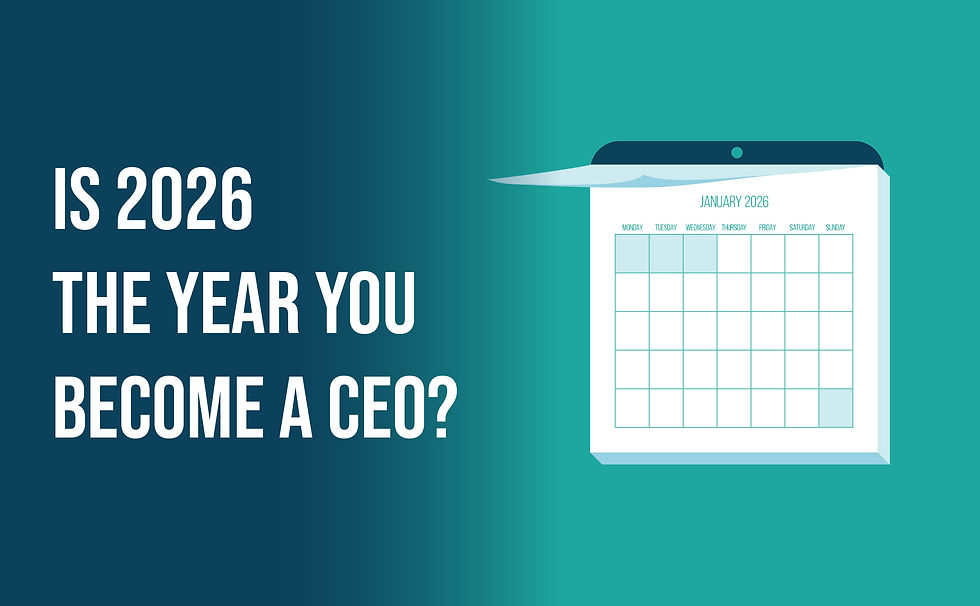ARE YOU AN EXECUTIVE IN YOUR 50S CONCERNED ABOUT MOVING ON TO YOUR NEXT ROLE?
- Mar 7, 2023
- 4 min read
Updated: Sep 19, 2024

Many executives in their 50s wonder whether they’ll ever get another executive role. The answer is ‘yes’ – with the right career coaching and preparation for the interview, there’s no reason you can’t smash the competition and land your dream role.
“More than 60% of our clients are in their fifties and are looking for an executive career coach to work out whether their careers have stalled,” Executive Interview Coaching founder Richard Elstone says.
“There’s no reason for that, but you do have to be fully prepared and confident to beat the competition, who are often younger.”
Here are some tips for landing your next executive role if you’re over 50:
Plan ahead
If you are at a crossroads in your career and feel that a change is needed, it’s a good idea to put together a five to 10-year plan. This will help clarify where you want to go and how to get there.
Tips for creating a five to 10-year plan:
Think about where you see yourself professionally in five to 10 years. What drives and inspires you?
What steps will you need to take to achieve that goal? Be specific and include timelines as part of the process.
What are your skills and experience? Which skills are transferable to the role you ultimately desire?
Research what skills you’ll need to transition into your ultimate executive role. Do you need to build on any skills or experience to achieve your end goal?
Refine your goals and make sure they are SMART – specific, measurable, achievable, relevant and time-bound.
Draw on your competitive advantage
Sure, younger prospects may be full of energy and have a fresh perspective, but at the end of the day, you can’t beat experience. And that’s your competitive edge – decades of hard-wired knowledge.
Other benefits of hiring talent over 50 are that they are usually loyal and less likely to jump ship when the next best offer arrives. They are also capable and can get on with the job, without hand-holding or second-guessing decisions.
“At the end of the day, companies are after experienced executives. Let’s face it – in your 50s, you’re an experienced executive,” says Richard.
Prepare meticulously
If you’re an experienced executive who can clearly articulate the value you can deliver, there’s no reason why your executive career should stall. So, how do you do that?
Well, firstly your resume has to be on point. It must cut through the competition and showcase how you have added value in previous roles. You can find tips for preparing your resume in our recent blog.
“The majority of executives I deal with have clearly added value to the businesses they have been working with, so it’s just a case of really getting that across in your resume,” says Richard.
Next, you need to engage your network, because usually it’s your network that will find you your next role. Find out how to leverage your network here.
After that, it all comes down to interview preparation according to Richard.
“Most people don’t know how to unpick a job description,” says Richard. “They spend far too much time researching the company and not enough time thinking about their experience and how to add examples during the interview process.”
“What’s more, many people prepare for interviews by themselves, but interviews are a conversation between one or multiple people,” says Richard. “It’s impossible to prepare for an interview staring at a computer screen and not engaging.
“My clients won’t die wondering if they interviewed well. They will interview well. If they don’t get the role, it will be for other reasons.”
Dress the part
If it’s been a while since you went for an executive interview, it’s important to get up to speed with what’s appropriate to wear nowadays.
You can find tips for how to dress for an executive interview in our recent blog.
“A lot of people in their 50s don’t understand the way you need to dress for an interview,” says Richard. “You’d be amazed how many people turn up to interviews with a suit they should have replaced, or they don’t have polished shoes. You never get a second chance to make a first impression.”
The bottom line is that if you look your best, you feel more confident, and are more likely to come across as an executive they’ll want to hire.
Broaden your horizons
If you’re considering transitioning into a non-executive board role, whether for experience or as part of your career progression, it’s equally as important to prepare well.
Again, you need to be clear about how you will contribute to the success of the organisation you join, and be ready for the interview process.
“It’s your performance in your executive career that will ultimately determine whether you can have a non-executive career in your 60s,” says Richard.
Ready to get started?
If you can demonstrate you’ve made a difference and added value in your previous role, your resume is well prepared and you are ready for the interview process, there’s no reason why you can’t land your dream role in your 50s.
For further advice and tips, get in touch with executive career coach Richard Elstone, from Executive Interview Coach to chat about your career goals.



